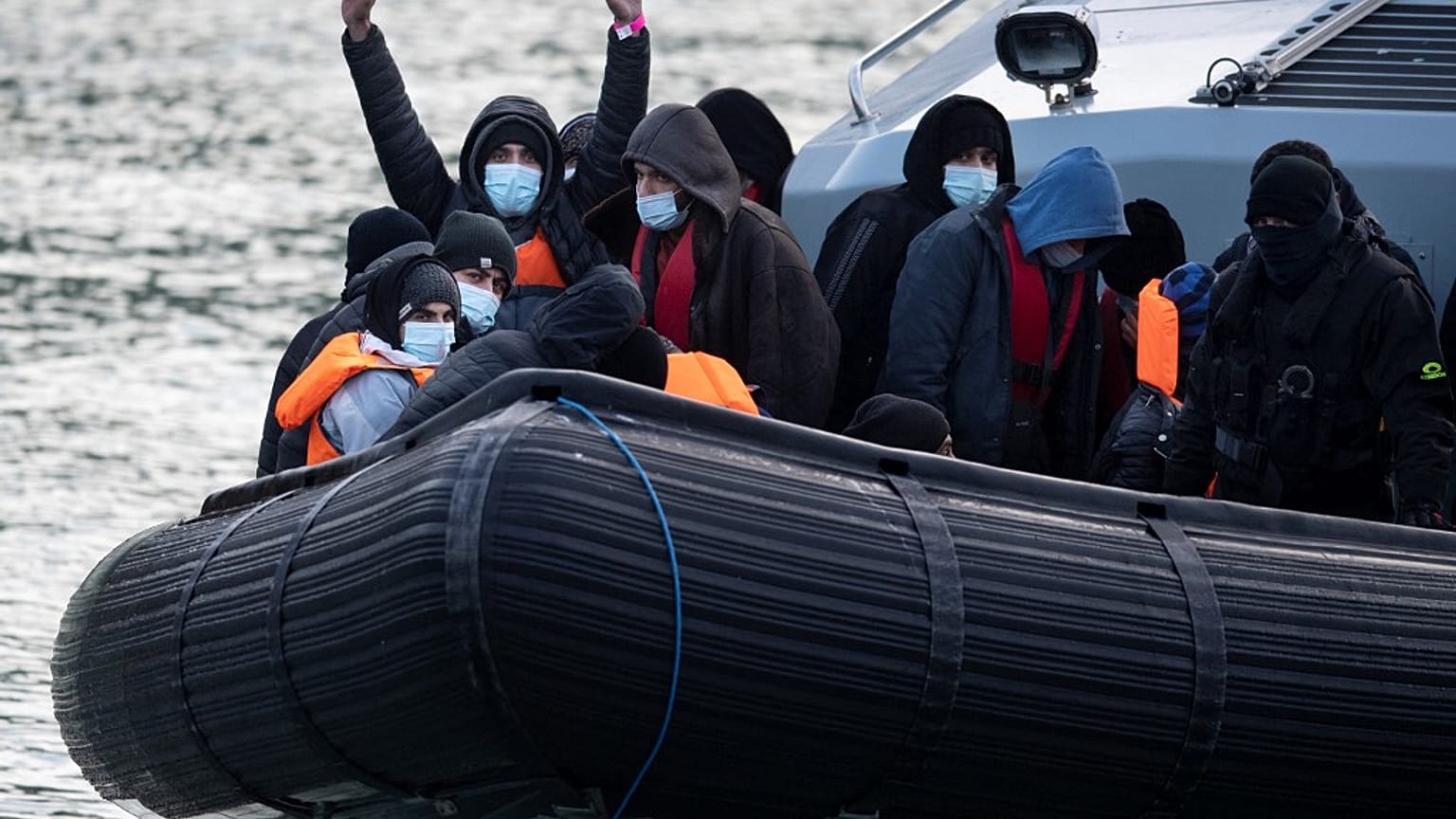London and Paris have agreed to deploy more resources and to tackle people-trafficking gangs, but critics say the deal fails to address underlying problems.
Britain and France on Monday signed an agreement worth €72.2 million over the coming year -- an extra €9 million -- to ramp up efforts to stop migrants and refugees from making perilous journeys across the English Channel.
 ADVERTISEMENT
ADVERTISEMENT
 ADVERTISEMENT
ADVERTISEMENT
"It is in the interests of both the UK and French governments to work together to solve this complex problem," British Home Secretary (interior minister) Suella Braverman said in a statement after meeting her French counterpart Gérald Darmanin in Paris.
It comes as the number of migrants making the perilous crossing in makeshift boats hit a new record high mark on Sunday -- more than 40,000 this year according to the British government. More than half are said to come from Albania, Afghanistan and Iran.
'No quick fixes'
Under the agreement, the UK will pay France €72.2 million in 2022-2023, up from this year's amount of around €63 million. In return, France commits itself to increase by 40% increase the number of officers patrolling French beaches. An extra 350 will be deployed in the coming months, AFP reports.
The British government said UK officers will also be embedded in French-led control rooms and on the ground with their counterparts for the first time to improve coordination and information sharing.
The agreement sets out to boost security at ports with more surveillance technology, drones, detection dog teams, CCTV and helicopters. Support is also promised for centres in France for migrants whose journeys are prevented.
However, there is no target for the number of boats to be intercepted, which the British government had wanted to be included according to UK media reports.
"There are no quick fixes, but this new arrangement will mean we can significantly increase the number of French gendarmes patrolling the beaches in northern France and ensure UK and French officers are working hand in hand to stop the people smugglers," Braverman said.
Both countries want to use intelligence, in particular from those who are stopped, to help dismantle smuggling networks and deter crossings by working with the migrants' countries of origin and transit nations.
A new taskforce is to be set up to try to reverse "the recent rise in Albanian nationals and organised crime groups exploiting illegal migration routes into Western Europe and the UK", the statement says.
The new agreement envisages the creation of new reception centres for migrants in the south of France to dissuade people crossing the Mediterranean from heading north to Calais, and instead offer "safe alternatives".
Deal 'fails to address' underlying problems
The number of migrants who have crossed the Channel since the start of the year -- more than 40,000 according to the UK defence ministry on Sunday -- compares to 28,526 for the whole of 2021.
The French maritime authorities said a little over 1,200 people attempted the journey over the weekend. The UK government believes the number could top 50,000 by the end of the year.
France says it has succeeded in preventing more than 30,000 small boat journeys in the Channel this year, but the challenge in patrolling hundreds of kilometres of northern coastline is immense.
Critics say the UK should instead open up more legal routes for people to come to the country.
"A deal is needed that focuses on creating more safe routes such as family reunion and working with the EU and other countries to find global solutions to share responsibility for what is a global challenge as more people are displaced by war, terror and violence," the UK Refugee Council said on Twitter, responding to the UK-France agreement.
The council, and others, accuse the British government of under-resourcing the asylum system.
"Carrying on the annual ritual of signing 'the deal to end it all' with France isn't a solution," tweeted Daniel Sohege, a specialist in international refugee law. "It is just paying out yet more money on a policy which has been proven not to work. We need that money being put into the asylum system."
Whereas the number of asylum applications has remained fairly stable, delays in processing applications have risen rapidly, he says, with only 4% dealt with last year.
The Refugee Council says 122,000 applications in the UK remain outstanding. The average waiting time for processing has been estimated at 16 months.
In recent weeks, British officials have come under fire for overcrowding and poor conditions at an asylum processing centre at Manston in Kent, with one facility in Dover being firebombed by an extremist at the end of October.
UK acts as 'suction pump', says French MP
The human tragedies involved came into sharp focus in November 2021, when an inflatable dinghy capsised in the Channel, causing the deaths of 27 of the 30 migrants on board.
At least 140 migrants were rescued from the Channel overnight on Friday into Saturday, according to Pierre-Henri Dumont, an MP for the Calais area from the right-wing Republicans party. "Every night it's like that," he told FranceInfo, speaking before the UK-France deal was confirmed.
He accused French and European authorities of inaction in tackling people-smugglers he said were "mostly Albanians".
And he singled out the UK for acting as a "suction pump", echoing a frequent French criticism of the British labour market. Migrants want to come to the UK "because it's easier to work there, to live in a community, and even if they are illegal, they can find work," he said.
Some have also highlighted the fact that since Brexit, the UK is no longer part of the EU's Dublin scheme, which allows countries to return asylum seekers to an EU state they passed through.
Long-standing political tensions
The agreement comes at a time when both governments are under pressure over migration.
Gérald Darmanin, the French interior minister accused by the right and the far right of not deporting enough foreigners banned from the country, will present a bill in early 2023 to tighten asylum procedures.
The number of asylum applications in France in the year to March 2022 (112,860) was well above the figure for the UK (66,838), according to official figures. France has been involved in a row with Italy over migrants rescued from the Mediterranean.
In the UK, the ruling Conservative party has made immigration control a priority since the Brexit, but is struggling with the constant wave of illegal crossings.
The rising number taking to small boats in the Channel partly reflects the success tighter border security has played in preventing people boarding lorries.
Relations between Britain and France have improved since new Prime Minister Rishi Sunak took office last month.
They had soured under Boris Johnson's tenure, and again this year after Liz Truss questioned whether French President Emmanuel Macron was a friend or foe during her campaign to become leader.
A British plan announced under Boris Johnson to send asylum seekers to Rwanda has stalled following legal challenges. Earlier this month Suella Braverman was accused of using inflammatory language after describing the arrival of asylum seekers on England's southern coast as an "invasion".














